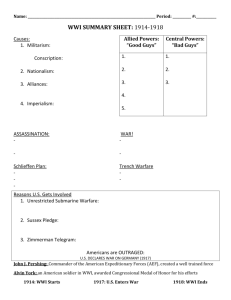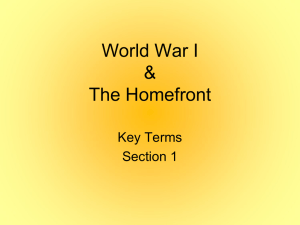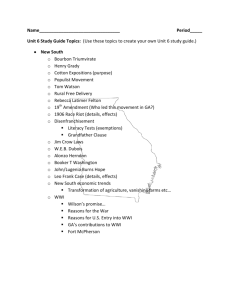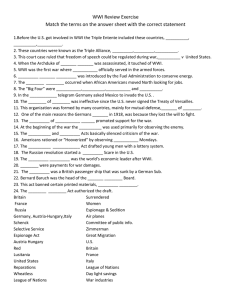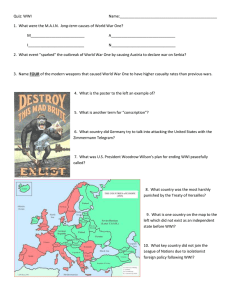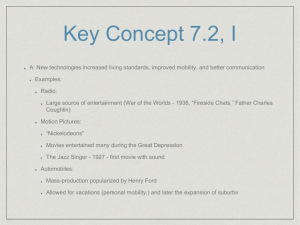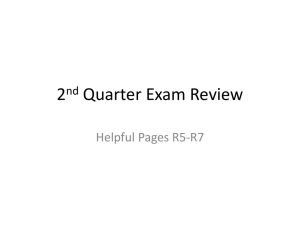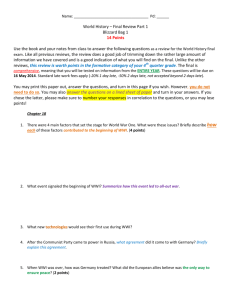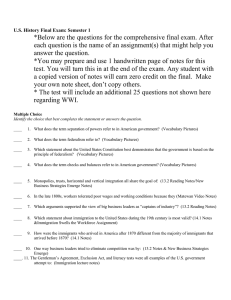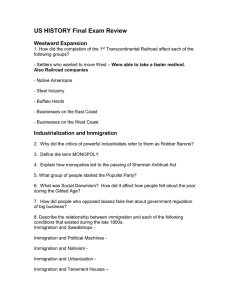Benchmark Review 2014
advertisement
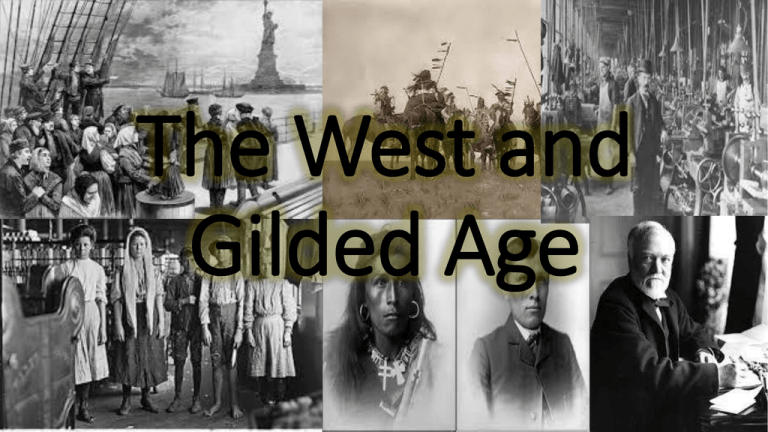
The West and Gilded Age Interstate Commerce Commission 1887 • A regulatory agency in the United States which served the purpose of regulating railroads. American Federation of Labor • Consisted of separate unions of skilled workers that joined together to form a federation. • The participating craft unions limited their memberships to skilled workers such as carpenters and cigar makers. Immigration • Chinese Exclusion Act: Restricted the immigration of Chinese immigration into the U.S. • Nativism: the attitude of wanting to limit immigration into the U.S. • Immigrants were forced into Americanization. Industrialization • The process of machinery using electricity that reduced the need of human labor. Homestead Act • The frontier is defined as the line separating areas of settlement from unsettled wilderness territory. • The Homestead Act assisted in the closure of the frontier because it populated the areas that were not populated. Andrew Carnegie • Used the Bessemer process to assist in the speed of steel production. • He was the only robber baron who gave back to poor. • Also known as philanthropy American Indian Policies • Reservation: • Once a tribe submitted to federal authority, its members were forced into reservations. • Land was smaller and undesirable • Dawes Act: • Each family was forced to live on reservation land (land was infertile) and were forced into Americanization (threatened Native American culture) • Land that was taken away was then given to White settlers • American Citizenship Act: • Granted immediate citizenship to all Native-American Indians born in the U.S. Political Machines • Assisted immigrants but stole from city governments through overpriced contracts • Provided immigrants with jobs in exchange for their votes • Dominated voting and controlled the agencies of government • Example: Boss Tweed of Tammany Hall Civil Service Reform • Government jobs were given to those who made contributions to politicians or who helped with their campaigns • President Garfield was shot by a person who was angry at not receiving a government job. • President Garfield decided to hire a person more qualified • Pendleton Act was passed by congress in 1883, which created the Civil Service Commission. • The Commission gave competitive exams and selected appointees based on excellence Women • Jane Addams: • Opened Hull House in Chicago • Assisted immigrant women and children • The right to vote: • Passed due to public protest and the 19th Amendment into the U.S. Constitution Upton Sinclair • Wrote “The Jungle” which produced the following: • The Pure Food and Drug Act: Regulated the food and drug companies to ensure the safety of all it’s products Reforms of Government • Initiative: a law that a group of citizens create and place on a ballot to be voted on. • Referendum: a law that is placed on a ballot by the Government that is to be voted on by the public (Americans) • Recall: The citizens of America can remove elected officials form office by voters in a special election What were the WWI new technologies & and the reason for their development? • Machine guns- rapid gun fire • Trench warfare- protection against machine guns • Tanks- defense against machine guns What was the Monroe Doctrine & the Roosevelt Corollary? • The Monroe Doctrine blocked further expansion of Europe in the Western Hemisphere, while the Roosevelt Corollary went one step further, where the United States military would intervene. How did WWI impact the economy of the United States? • The United States emerged as a superpower. What is the Espionage Act of 1917? • The Espionage Act of 1917 is a United States federal law passed on June 15, 1917, that allowed a a persons 1st amendment right to be limited during a time of war. How did the US enter WWI? •Germany blew up the Lusitania using unrestricted submarine warfare. What was the economic effect of the Spanish American War? • Businesses used the new territories gained to expand their businesses to foreign markets. Social causes of WWI What caused the Stock Market to crash? •People were buying products and shares on credit (with money that they didn’t have) What was the impact of the Harlem Renaissance? • There was a spread of the black culture (music & literature) What impact did Social Darwinism have on society? • The idea was used to justify that the wealthy are likely to thrive and survive in society. What caused the Great Migration? • African Americans traveled from the south to the north for better economic opportunites. What were the terms of President Harding’s “Return to Normalcy” policy? • The Return to Normalcy policy focused on trying to get the US to the way it was before WWI by focusing on industrialization and by staying isolated. What are major events of the Transition to Modern America era? •Prohibition •Great Migration •Harlem Renaissance •Economic Boom
